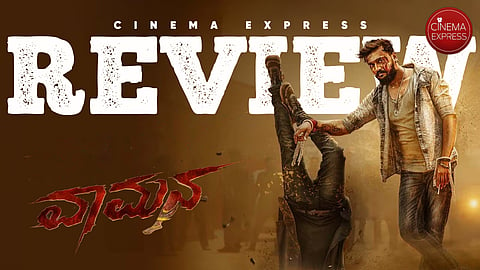Vamana Movie Review: Dhanveerrah embraces mass heroism in an actioner without commercial trappings
Vaamana,(3 / 5)
Every bloodstain has its reason, every fight its purpose—and in Vamana, chaos is both personal and raw. Inspired by mass films that open with explosive action, Vamana channels that energy into deeper struggles: identity, revenge, and survival. It blends high-octane spectacle with emotional weight, rooted in themes of morality, mother-son bonds, and internal conflict. At its centre is Dhanveerrah’s Guna, a character who balances mass appeal with layered complexity. The title Vamana is a nod to the Vishnu avatar who concealed divine power behind humility. Likewise, Guna—Vishwa to his mother (Tara)—masks strength beneath silence. But unlike the God’s clear purpose, Guna walks a morally grey path where power is tested and disguised.
Director: Shanker Raman S
Cast: Dhanveerrah, Reeshma Nanaiah, Sampath Raj, Aditya Menon, Achyuth Kumar, Tara, Avinash, Petrol Prasanna, Cockroach Sudhi, and Shivaraj KR Pete
Guna is no mere vigilante; he’s a fractured soul driven by betrayal and abandonment. With a police force rendered useless, his violence becomes a cry for justice and a reckoning with paternal sins. As Karamlal (Aditya Menon) and Papanna (Sampath Raj) tighten their grip, Guna emerges as a lone force in a system built on fear and silence. Enter Nandini (Reeshma Nanaiah), who brings warmth and stillness to Guna’s blood-soaked life. More than a love interest, she humanises him. Moments like a birthday celebration amidst carnage offer glimpses of the life he could’ve had.
The emotional turning point comes with the death of Guna’s closest ally, Ravi. Soon after, the real twist hits: Papanna, the antagonist, shares a hidden familial bond with Guna—one rooted in betrayal that scars both mother and son. Tara’s performance reaches its peak in a flashback filled with restraint and quiet rage. Her vow to not see her son until he cleanses the world of evil lands as both heartbreak and prophecy.
Violence in Vamana is not empty spectacle—it’s a consequence. For instance, every blow from Guna tells a story. Guna’s bloodstained hands carry the weight of justice unfulfilled and a mother’s pain unresolved. He’s a man caught between vengeance and salvation, both conqueror and cautionary tale.
Director Shankar Raman avoids formulaic beats and crafts a story where action serves emotion. His world is gritty, morally complex, and far more grounded than typical mass cinema. Ajaneesh Loknath’s music deepens the mood—'Kanda Kanasa Suduva' stirs maternal longing, while tracks like 'Muddu Rakshasi' and 'Ili Sanje Kadala Theera' offer soulful reprieve between bursts of chaos.
Dhanveerrah brings both mass energy and emotional gravity. Tara anchors the film with strength and sorrow, while Reeshma Nanaiah delivers charm with grounded realism. Though some veterans feel underused, Sampath Raj and Aditya Menon provide solid antagonistic presence. Supporting actors like Girish Jatti, Petrol Prasanna, and Cockroach Sudhi add to the raw grit of the action.
By its final act, Vamana becomes a dharma yuddha—a moral war fought by not Gods but by flawed men in a crumbling world. Guna, like his mythic namesake, is saviour and sinner, deceiver and deliverer. In a genre often content with noise, Vamana dares to ask: Who truly holds the moral high ground? And how much blood must be spilled for peace to return? It’s more than an action film—it’s a blood-soaked emotional drama, steeped in myth and consequence, built to connect with fans of emotionally charged mass cinema.

